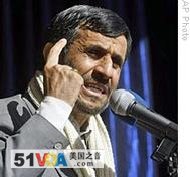Washington
09 February 2009
The 30th anniversary of the Iranian revolution occurs halfway between two potentially transformative elections. The United States elected a new leader in November, and Iranian voters will choose a new president in June. The twin polls could mark a new direction for both countries.
With the election of President Barack Obama, Tehran and Washington are each eying the other warily to see who will make the first step down the path of renewed relations. Iranian affairs analyst Reva Bhalla of the private intelligence firm Stratfor says both sides are starting to look for some common ground.
"From the Iranian point of view, it is really the time now to sort of take things slowly, kind of feel out the Obama administration, what kind of offers are on the table, and then move on from there," she said. "But really right now it is kind of feeling out each other on where they can come to agreement on key issues like Iraq, the nuclear program, Afghanistan, things of that sort."
But determining Iran's stance on relations with the United States is difficult for analysts to gauge because there is little about Iranian politics and governance that is straightforward. In the years since the 1979 revolution, Iran has developed a complex system with multiple powerful factions, all operating in near-total secrecy.
 |
| Iranian President Mahmoud Ahmadinejad |
Middle East analyst Alex Vatanka of Jane's Information Group says actual power on key issues such as the nuclear program and relations with the U.S. is in the hands of a small group of people.
"A small elite of people in the Supreme National Security Council, also in the Guardian Council, the Expediency Council - you are talking about less than 50 people combined - decide on the major issues. And the irony of it is, the real challenges facing Iran are those sensitive issues," he said.
Vatanka says the Iranian president's clout has evolved in the years since the Iranian revolution.
"What we have seen is the presidency's level of influence has been shaped by the situation domestically, particularly the position of the Supreme Leader, and the external environment," he said. "So it is not as if the institutions themselves within the country have evolved so much. They have always reacted to what is going on, mainly outside, and in terms of rivalries that happen between the Supreme Leader and the other major figures in the Islamic Republic."
Iran has its own presidential election coming up in June. Analysts expect the economy to be the hot electoral issue. Iran's economic picture, already bleak, has been made worse by the financial crisis spanning the globe. World oil prices have plummeted, cutting into Iran's export revenues, and inflation was more than 25 percent last year.
But analysts say the issue of U.S.-Iranian relations may be a campaign topic, although a delicate one. The former reformist president Mohammad Khatemi has decided to challenge President Ahmadinejad. Among the other potential candidates are Tehran mayor Mohammad Baqer-Qalibaf, former nuclear negotiator Ali Larijani, and former Revolutionary Guard chief Yahya Rahim Safavi, who is also a military advisor to the Supreme Leader.
Analyst Bhalla says that means voters will have stark choices - depending on whose candidacies the Guardian Council approves.
"You will have two very clear ideological positions out there on the ballot. I think we are still going to see more of a leaning toward the pragmatic conservative side," she said.
She adds that both countries need to psychologically prepare their populations for any rapprochement, and that, she says, will take time.
"You have to get used, or get your populace used, to the idea of talking to the so-called 'Great Satan' because that is kind of a big leap to make," she said. "So it is time to start actually sending out those feelers, making statements that, well, we will cooperate with you as long as you see our side of things. And Iran always wants to demonstrate that it is negotiating from a position of strength."
Sports exchanges are often a prelude to a diplomatic thaw, as when exchanges of U.S. and Chinese ping-pong teams in the 1970s heralded the eventual trip of U.S. President Richard Nixon to China.
Iran and the U.S. have had similar sports exchanges, but Tehran recently invited a U.S. women's badminton team to compete in a tournament, only to deny them visas. Analysts say the rebuff likely signals an intense debate in Iranian ruling circles about how to treat any possible opening with the United States.